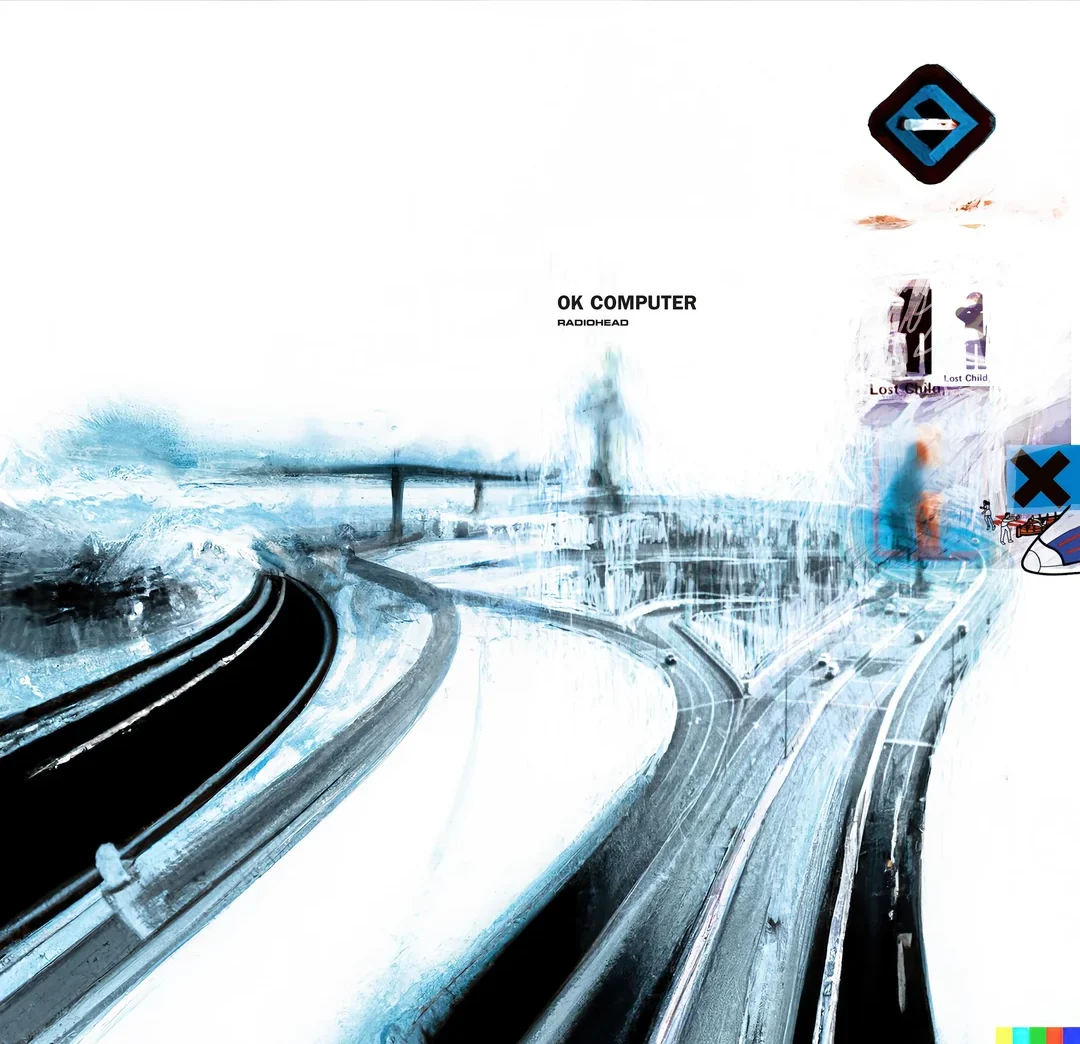

27 years of Radiohead’s Epic Album: OK Computer
Released in 1997, Radiohead’s seminal album OK Computer stands as a monumental piece in the alternative rock genre. This groundbreaking work not only solidified Radiohead’s position in the music industry but also revolutionized the genre, influencing countless artists and bands that followed. Widely regarded as one of the greatest albums of all time, OK Computer is known for its intricate composition, innovative production, and thought-provoking lyrics.
Prior to OK Computer, Radiohead had already made waves with their earlier albums, particularly with their 1995 release, The Bends. The band’s ability to blend melancholic themes with powerful, guitar-driven melodies garnered them a dedicated following and critical acclaim. However, it was with OK Computer that Radiohead truly pushed the boundaries of their sound, incorporating electronic elements, unconventional song structures, and a more experimental approach to music-making.
The album’s themes revolve around modern alienation, technology’s impact on society, and the disconnection of human experience in an increasingly digital world. These themes resonated deeply with listeners at the time of its release and continue to do so today, making OK Computer a timeless classic. Its tracks such as “Paranoid Android,” “Karma Police,” and “No Surprises” have become anthems, showcasing Radiohead’s ability to create music that is both emotionally powerful and intellectually stimulating.
Overall, OK Computer is not just an album but a significant cultural artifact that captured the anxieties and uncertainties of its era. It marked a pivotal moment in Radiohead’s career, propelling them from a respected band to one of the most influential acts in modern music history.
Track-by-Track Breakdown
Radiohead’s album “OK Computer” opens with “Airbag,” a track that sets the tone for the entire album with its blend of electronic and rock elements. The song’s themes revolve around rebirth and survival, highlighted by Thom Yorke’s introspective lyrics. The juxtaposition of Jonny Greenwood’s distorted guitar riffs against the backdrop of electronic beats creates an immersive experience that grabs the listener’s attention right from the start.
“Paranoid Android” follows, an ambitious, multi-part epic that is often considered one of Radiohead’s masterpieces. The track is divided into distinct sections, each with its own tempo and mood, reflecting themes of insanity and societal disillusionment. The lyrical content is cryptic yet evocative, complementing the complex musical arrangement that includes everything from acoustic strumming to haunting choral arrangements.
The third track, “Subterranean Homesick Alien,” diverges slightly with its ethereal, spacey soundscape. The song’s lyrics narrate the feeling of alienation and the desire to escape, encapsulated in the metaphor of an extraterrestrial observing human life. The use of reverb-laden guitars and ambient effects creates a dreamlike quality that perfectly conveys the song’s themes.
“Exit Music (For a Film)” slows things down with its haunting, minimalist arrangement. Initially stripped-down with just an acoustic guitar and Yorke’s haunting vocals, the song gradually builds in intensity, adding layers of instrumentation that culminate in a powerful, emotionally charged climax. The lyrics, inspired by Shakespeare’s “Romeo and Juliet,” deal with themes of escape and defiance.
“Let Down” returns to a more upbeat tempo but maintains the album’s thematic focus on existential angst and disillusionment. The song’s intricate layering of guitars and synthesizers creates a rich, textured sound that contrasts with the melancholic lyrics. This juxtaposition makes “Let Down” a standout track for many fans.
These tracks, along with others like “Karma Police,” “Fitter Happier,” and “No Surprises,” contribute to the album’s status as a seminal work in the alternative rock genre. Each song on “OK Computer” offers its own unique exploration of themes ranging from technological alienation to personal introspection, making it a cohesive yet diverse listening experience.
Themes and Lyrics
Radiohead’s “OK Computer” delves deeply into themes such as technology, alienation, and societal issues. These themes are intricately woven into the album’s lyrics, penned by Thom Yorke, creating a profound narrative that critiques modern life. The album, released in 1997, captures the growing unease with the rapid advancement of technology and its implications on human connectivity and societal norms.
One of the most prominent themes in “OK Computer” is the encroachment of technology on everyday life. The track “Paranoid Android” is a prime example, with lines like “When I am king, you will be first against the wall” reflecting a dystopian vision of technological dominance. This theme of technology is also evident in “Fitter Happier,” where Yorke presents a robotic monologue of a life optimized by technology, yet devoid of genuine satisfaction.
Alienation is another key theme explored in the album. The song “Karma Police” touches on this with the line, “For a minute there, I lost myself,” encapsulating the disconnection and loss of identity in a conformist society. This sense of alienation is further emphasized in “No Surprises,” which paints a bleak picture of suburban life with the lyrics, “A handshake of carbon monoxide.” These songs convey the disillusionment and isolation felt by individuals amidst societal pressures and expectations.
Societal issues are also a recurring theme throughout “OK Computer.” In “Electioneering,” Yorke’s lyrics, “When I go forwards, you go backwards,” critique political manipulation and the erosion of democratic values. The album’s exploration of these themes was highly relevant in the late 1990s, a period marked by significant technological and political changes. Today, the relevance of these themes persists, as the world continues to grapple with the impact of technology on privacy, identity, and social interaction.
Through Thom Yorke’s evocative lyrics, “OK Computer” offers a compelling commentary on the complexities of modern existence. The album’s themes of technology, alienation, and societal critique not only captured the anxieties of its time but continue to resonate with listeners today.
Musical Innovation and Style
‘OK Computer’ by Radiohead stands as a significant milestone in the evolution of modern music, characterized by its eclectic blend of rock, electronic, and experimental sounds. This album diverged from the traditional Britpop style that was prevalent during the late 1990s, instead opting for a more avant-garde approach. The amalgamation of diverse musical elements is a testament to the band’s willingness to push boundaries and redefine genre conventions.
Central to the album’s unique sound is the meticulous production work by Nigel Godrich, who played an instrumental role in shaping its auditory landscape. Godrich’s expertise in employing innovative production techniques is evident throughout the album. For instance, the use of extensive layering and ambient soundscapes creates a rich, immersive listening experience. The tracks are meticulously crafted, with each instrument and vocal layer contributing to a cohesive yet complex sound.
One of the noteworthy aspects of ‘OK Computer’ is the integration of electronic elements with traditional rock instrumentation. Songs such as “Airbag” and “Paranoid Android” seamlessly blend electric guitars with synthesizers and drum machines, creating a futuristic sound that was ahead of its time. This fusion of analog and digital textures highlights the band’s forward-thinking approach to music production.
Moreover, Radiohead’s use of unconventional instruments and recording methods further distinguishes the album. The inclusion of instruments like the Mellotron, Ondes Martenot, and various forms of audio manipulation techniques adds an experimental edge to the album. For example, the track “Climbing Up the Walls” features eerie string arrangements and distorted sound effects, enhancing its haunting atmosphere.
In addition to the innovative use of instruments, Radiohead and Godrich employed creative recording techniques, such as the use of natural reverb from unconventional spaces and the manipulation of tape speed. These methods contributed to the album’s distinctive sonic character, setting it apart from its contemporaries.
In essence, ‘OK Computer’ exemplifies Radiohead’s commitment to musical innovation. The album’s unique style, shaped by a blend of rock, electronic, and experimental sounds, along with groundbreaking production techniques, has cemented its place as a seminal work in the annals of music history.
Critical Reception and Awards
Upon its release in 1997, Radiohead’s album OK Computer received widespread critical acclaim, rapidly cementing its status as a landmark in modern music. Notable music critics and publications praised the album’s innovative sound and thematic depth. For instance, Rolling Stone lauded it as “a stunning art-rock tour de force,” while NME declared it “a cerebral masterpiece.” The album’s ambitious fusion of rock with electronic elements and its dystopian lyrical content resonated profoundly with listeners and critics alike.
The accolades for OK Computer were numerous. At the 1998 Grammy Awards, the album received nominations for Best Alternative Music Album and Best British Album, eventually winning the latter. Additionally, the single “Paranoid Android” earned a nomination for Best Music Video. The album’s critical success was further validated by its inclusion in numerous “best of” lists. For example, it topped Q Magazine‘s list of the 100 Greatest Albums of All Time in 2006 and was ranked number 162 on Rolling Stone‘s 500 Greatest Albums of All Time in 2020.
The long-term legacy of OK Computer is evidenced by its enduring influence on both critics and fans. It is frequently cited as one of the greatest albums of all time, continuing to receive praise for its visionary approach to music. Critics often highlight its role in shaping the sound of late 1990s and early 2000s rock, inspiring a generation of artists across various genres. Fans, too, regard it as a touchstone, with many considering it Radiohead’s magnum opus. Its themes of technological alienation and societal dislocation remain relevant, ensuring its place in the pantheon of timeless music.
The release of Radiohead’s “OK Computer” in 1997 marked a pivotal moment in the music industry. This seminal album not only redefined the boundaries of alternative rock but also set a new precedent for artistic innovation. Its intricate blend of electronic elements, unconventional song structures, and thought-provoking lyrics resonated deeply with both critics and listeners, prompting a shift in the musical landscape.
One of the most significant impacts of “OK Computer” was its role in shaping the future of alternative rock. The album’s experimental approach encouraged other artists to explore new sonic territories, pushing the genre beyond its conventional limits. Bands like Coldplay and Muse have openly acknowledged the influence of “OK Computer” on their own music. Chris Martin, the lead vocalist of Coldplay, once stated, “It’s hard to overstate the influence ‘OK Computer’ had on us. It showed us that you can be ambitious and experimental while still reaching a wide audience.”
In addition to inspiring established acts, “OK Computer” also paved the way for a new generation of musicians. Its impact can be seen in the works of contemporary bands such as Arcade Fire and The National, who have embraced its ethos of blending electronic and rock elements. Win Butler of Arcade Fire has cited “OK Computer” as a major influence, saying, “Radiohead’s ability to create something so expansive and cohesive was a game-changer for us. It taught us the importance of pushing boundaries and taking risks.”
The album’s influence extends beyond just its sound. “OK Computer” also revolutionized the way albums were conceptualized and produced. Its thematic cohesion and narrative depth encouraged artists to think of albums as complete works of art rather than just collections of songs. This holistic approach to album-making can be seen in the works of artists like Kanye West and Kendrick Lamar, who have both created concept albums that strive to tell a unified story.
Overall, “OK Computer” left an indelible mark on the music industry, inspiring countless artists to innovate and challenge the status quo. Its legacy continues to be felt today, as it remains a touchstone for musicians seeking to push the boundaries of what rock music can achieve.
Band’s Perspective
The creation of ‘OK Computer’ was a defining moment for Radiohead, encapsulated by a unique blend of ambition, experimentation, and a desire to push musical boundaries. Thom Yorke, the band’s enigmatic frontman, has often reflected on the intense period of recording the album. “We wanted to make something that didn’t sound like anybody else,” Yorke explained in an interview. “It was about capturing this sense of disconnection and alienation that we were feeling at the time.”
Guitarist Jonny Greenwood echoed Yorke’s sentiments, elaborating on the band’s innovative approach to recording. “We were constantly looking for new ways to manipulate sound,” Greenwood said. “Using the studio as an instrument in itself was a big part of our process. It allowed us to explore textures and atmospheres that were unexplored in our previous work.” This relentless pursuit of sonic innovation is evident in tracks like “Paranoid Android” and “Climbing Up the Walls,” where traditional rock elements are seamlessly intertwined with electronic effects and unconventional song structures.
Bassist Colin Greenwood and drummer Phil Selway also shared their perspectives on the album’s creation. Colin Greenwood noted, “The sessions were both exhilarating and exhausting. We were in a creative frenzy, trying to capture the essence of what we were feeling in those moments.” Selway added, “There was a sense of urgency and importance in what we were doing. We knew we were onto something special, but we had no idea how it would be received.”
The band’s collective efforts culminated in an album that not only redefined their career but also left an indelible mark on the music industry. “OK Computer” was met with critical acclaim, and its success surprised even the band members. “None of us expected it to resonate so widely,” Yorke admitted. “It’s humbling to see how much the album means to people, even after all these years.”
Personal Reflection
Radiohead’s “OK Computer” stands as a pivotal moment in music history, capturing the angst and alienation of a generation on the cusp of the digital age. Its enduring appeal lies in its masterful blend of innovative soundscapes, poignant lyrics, and the band’s fearless exploration of complex themes. Even over two decades after its release, the album continues to resonate with listeners, offering fresh insights with each listen.
The album’s relevance today can be attributed to its prescient exploration of themes that have only grown more pertinent. From the anxiety of technological advancement to feelings of social disconnection, “OK Computer” addresses issues that are increasingly significant in our contemporary world. Songs like “Paranoid Android” and “Karma Police” still evoke powerful emotional reactions, while tracks such as “No Surprises” and “Climbing Up the Walls” reveal layers of meaning that remain compelling.
Encouraging readers to experience “OK Computer” firsthand is essential. Listening to the album provides an opportunity to engage with its intricate production, thoughtful lyrics, and emotive performances. Forming a personal connection with the music allows for a deeper appreciation of its artistic merits and its place in the broader context of musical innovation.
In our comprehensive review, we have delved into the various facets that make “OK Computer” a landmark album. We discussed its groundbreaking sound, the thematic depth of its lyrics, and its critical and commercial success. Each of these elements contributes to the album’s lasting significance and its ability to remain relevant in an ever-changing musical landscape.
“OK Computer” is more than just an album; it is a cultural artifact that continues to inspire and challenge listeners. Its importance in music history is undeniable, and its ability to connect with audiences today underscores its status as a timeless masterpiece.






